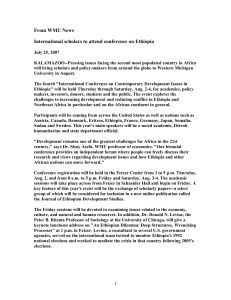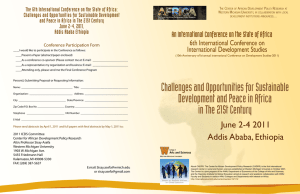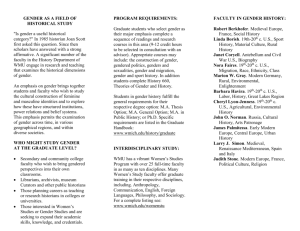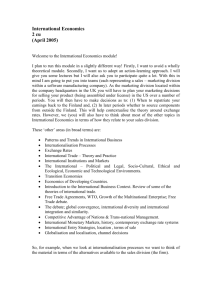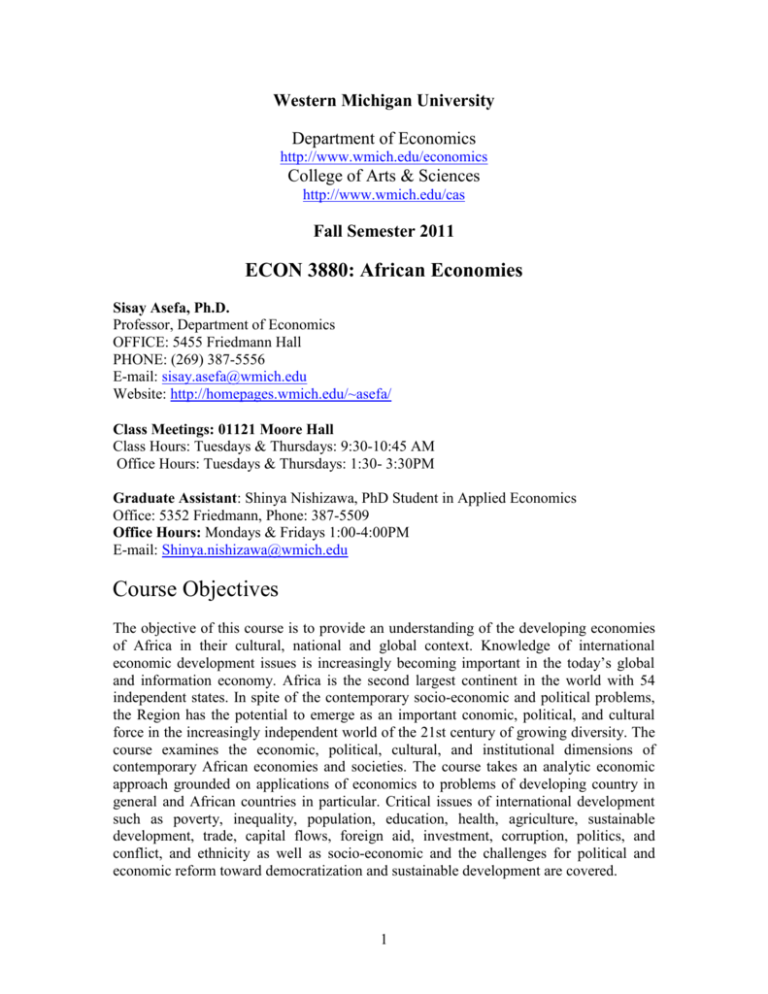
Western Michigan University
Department of Economics
http://www.wmich.edu/economics
College of Arts & Sciences
http://www.wmich.edu/cas
Fall Semester 2011
ECON 3880: African Economies
Sisay Asefa, Ph.D.
Professor, Department of Economics
OFFICE: 5455 Friedmann Hall
PHONE: (269) 387-5556
E-mail: sisay.asefa@wmich.edu
Website: http://homepages.wmich.edu/~asefa/
Class Meetings: 01121 Moore Hall
Class Hours: Tuesdays & Thursdays: 9:30-10:45 AM
Office Hours: Tuesdays & Thursdays: 1:30- 3:30PM
Graduate Assistant: Shinya Nishizawa, PhD Student in Applied Economics
Office: 5352 Friedmann, Phone: 387-5509
Office Hours: Mondays & Fridays 1:00-4:00PM
E-mail: Shinya.nishizawa@wmich.edu
Course Objectives
The objective of this course is to provide an understanding of the developing economies
of Africa in their cultural, national and global context. Knowledge of international
economic development issues is increasingly becoming important in the today’s global
and information economy. Africa is the second largest continent in the world with 54
independent states. In spite of the contemporary socio-economic and political problems,
the Region has the potential to emerge as an important conomic, political, and cultural
force in the increasingly independent world of the 21st century of growing diversity. The
course examines the economic, political, cultural, and institutional dimensions of
contemporary African economies and societies. The course takes an analytic economic
approach grounded on applications of economics to problems of developing country in
general and African countries in particular. Critical issues of international development
such as poverty, inequality, population, education, health, agriculture, sustainable
development, trade, capital flows, foreign aid, investment, corruption, politics, and
conflict, and ethnicity as well as socio-economic and the challenges for political and
economic reform toward democratization and sustainable development are covered.
1
Course Materials and References:
Required Book:
Economic Development, 11th edition, by Michael Todaro & Stephen Smith,
Pearson Addison-Wesley, 2012: Book website: www.aw-bc.com/todaro_smith
Online Study Guide: http://wps.aw.com/aw_todarosmit_econdevelp_11
Recommended Books & References
Economic Development, 6th edition by D. Perkins, S. Radelet & D. Lindauer, Norton Pub.2012
Online Study Guide: Study Space: http://www.wwnorton.com/college/econ/dev6/
Textbook website: http://www.wwnorton.com/college/titles/econ/dev6/
African Economic Development, edited by Emmanuel Nnadozie, Academic Press, 2003,
The Economics of Sustainable Development, edited by S.Asefa, W.E.Upjohn Institute for
Employment Research, Kalamazo, MI 2005
The State of Africa: 50 Years of Independence, by Martin Meredith, The Free Press, UK.2005.
Globalization and International Development, edited by Sisay Asefa, PhD, W.E.Upjohn Institute
for Employment Research, Kalamazoo, Michigan, 2010, USA
Dead Aid: Why Aid is not working & How there is a better way for Africa, Dambisa Moyo,
Farrar, Straus and Giroux, New York,2009
Development As Freedom, by A.K Sen, Alfred A. Knof, Inc.New York, 1999
Tips on Successful Learning in this Course
The best way to understand economics is to think and work through concepts and problems and
their applications, and not to simply memorize. Your textbook website has useful Online Study
Guide that will enhance your understanding of the course. Go into the online study guide of the textbook
website at: http://wps.aw.com/aw_todarosmit_econdevelp_11/181/46378/11872794.cw/index.html . The
online study guide organizes aimed at enhancing your learning. The learning practice questions or
problems are provided M/C & T/F questions & Problems form. There is optional Quantitative
exercise aimed at advanced students that major in economics and statistics, engineering and then
natural sciences with quantitative background. There are answers are provided for the quizzes
aimed at enabling you to self-check your work. You should refer to the solutions or answers on
online Study Guide material only after you have read the chapters carefully. Each test is during
the class period, and the final is two hours long during the Final Week of the Semester in
December. Make sure to check the date of the specific final date and time on WMU Academic
Calendar. Tests are multiple choice questions and problems. They may also include short answer
questions and problems. Tests are designed to enhance your ability to apply the economic
concepts covered and the understanding of important analytical concepts and their applications,
including definitions covered in the course or the required text book. The best ways is to
maximize your score in this course to do the following: Read each chapter carefully, Review the
PP Lecture Notes for each chapter, Answer the practice M/C and T/F quizzes, try the Quantitative
problems (optional-for advanced students with strong quantitative back background).
2
Course Outline & Required Reading Assignments
I. INTRODUCTION: Theories and Measures Economic Growth and Development
A .Introduction to Economic Development: A Global Perspective (Chapter1)
B. Comparative Economic Development (chapter 2)
C. Theories of Economic Growth and Development (Chapter 3)
D. Poverty, Inequality and Development (Chapter 5)
Test #1 Chapters 1, 2, 3, 5 ( September 29)
II: Human and Natural Resource Development: Poverty, Population & Human Capital,
Agriculture & the Environment
A.
B.
C.
D.
E.
Population Growth and Economic Development (Chapter 6)
Migration and Urbanization ( Chapter 7)
Human Capital: Education and Health in Economic Development (Chap.8)
Agricultural Transformation and Rural Development (Chapter 9
The Environment and Economic Development (Chapter 10
Test #2:Chapters: 6,7,8,9,10 ( October 20)
III. International Economics and Institutions: Problems and policies
A. Development Policy & Role of Markets, State and Civil Society( chapter 11 )
B. International Trade and Development Strategy (Chapter 12)
C. Financial Crises, Debt and Stabilization Policies (Chapter 13)
D. Foreign Investment, Finance & Aid: controversies & Opportunities (Chapter 14)
E. Development Finance and Fiscal Policy for Development (Chapter 154)
Test #3 Chapters 11,12,13, 14,15 (November 17)
IV. Development Challenges of African Economies for 21st Century
“Can Africa Claim the 21st Century?” (A World Bank Report On Line)
http://web.worldbank.org/WBSITE/EXTERNAL/COUNTRIES/AFRICAEXT
United Nations Millennium Goals: http://www.un.org/millenniumgoals/
A Note Grading: Tests, Final and Group Reports
There are a total of 3 tests with 50 points each and a comprehensive Final Examination
for 100 points, constituting total 250 raw points. Final Grades are assigned based on
percentage scale. Group case studies of African states will be assigned that constitute 10% of
your grade. Guidelines of the group case studies will be handed out or sent by e-mail because
Case study presentations are scheduled. The Case studies will involve an African county case
study based on Guidelines provided by the Professor to evaluate their performance and
progress or lack of it using concepts and issues covered in the book and/or in the lectures. Each
test constitutes 20 percent of your grade for total of 60% and the final constitutes 30% of your
grade, and Group Reports constitute 10%, for grand total of 100% to calculate final grades.
3
For the final schedule, please check WMU Registrar for specific date at the following
webpage: http://www.wmich.edu/registrar/calendars/
Incomplete Grade and Test Make up Policy:
Make-up tests are discouraged unless there are extenuating circumstances such as a serious illness
and death in the immediate family. If a student must take a make-up, prior notification is
required. Unexcused absence from taking a test or the final will result in an automatic zero.
University policy for getting incomplete (I) will be applied. An Incomplete or I grade will be
given to a student whose performance is satisfactory, but who cannot complete a course for a
reason beyond the students control such as a serious illness that can be verified. There are no
provisions for extra credit beyond the requirements stated in this syllabus.
WMU Academic Integrity Statement
You are responsible for abiding with the policies and procedures in the WMU Undergraduate
Catalog that pertains to Academic Integrity. These policies include cheating, fabrication,
falsification and forgery, multiple submission, plagiarism, complicity and computer misuse. If
there is reason to believe you have been involved in academic dishonesty, you will be referred to
the Office of Student Conduct. You will be given the opportunity to review the charge(s). If you
believe you are not responsible, you will have the opportunity for a hearing. You should consult
with me if you are uncertain about an issue of academic honesty prior to the submission of an
assignment or test. The specific policy in this class for cheating on a test or the Final is an
automatic failure in that particular test or examination.
Student Notes:
4

